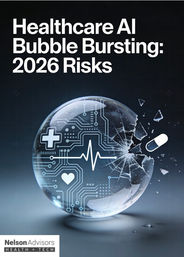KardiaMobile : The 21st Century Stethoscope?
- Tara Donnelly
- Feb 15, 2018
- 5 min read

KardiaMobile
This week we are providing 350 mobile ECG devices to settings across south London to help detect the most common cardiac arrhythmia called atrial fibrillation or AF. These devices are going into a variety of settings including GP surgeries, community pharmacies, podiatry services, optometry, acute mental health units and care homes with the aim of finding many more people who are unaware that they have this condition. AF contributes to one in five strokes and is associated with a 20% increased likelihood of mortality, so those identified as having AF are given appropriate treatment to significantly reduce their risk of having a stroke.
We’ve been seeking to raise the profile of AF across the country and were delighted that London Mayor Sadiq Khan joined our campaign addressing Londoners in this short film made for Global AF Awareness Week.
My organisation, Health Innovation Network, is the Academic Health Science Network, or AHSN, for south London and we exist to speed up the best innovations across this geography. However, it is not just south Londoners who will benefit, every part of the country will as all 15 AHSNs, covering the full population of England, are busy distributing them to member organisations starting this week.

Some people with AF experience no symptoms, or intermittent symptoms, that come from time-to-time and may not be present when people undertake cardiac examinations such as a 12-lead ECG. By being able to check much more readily and frequently, we increase the likelihood of picking up the presence of these intermittent symptoms.
Dr David Albert
This clinical challenge was tackled by an innovative clinician who saw opportunities to improve care. Dr David Albert a highly entrepreneurial cardiologist who graduated from Harvard and Duke, devised a device that can take a clinical grade ECG in 30 seconds on your smartphone, now known as Kardia, and its uptake across the NHS is led by Francis White, working for the company David founded, AliveCor.

David is a serial inventor and has a mission of “saving lives one invention at a time …36 patents and counting”. What is fascinating is that he had the idea for this device back in the mid-90s and patented it then, but the rate limiting step was that smartphones were not yet ready to support these devices for another 15 years.
David was also turned away by all the major manufacturers and venture capitalists when he built the first Kardia, so set up his own company. The interest began in 2011 when he posted a short YouTube clip of Kardia on LinkedIn that went viral and he had investors and distributors queuing up to be involved.
Famously, Dr Eric Topol, another cardiologist and author of one of my all-time favourite books on how digital is transforming healthcare – The Patient Will See You Now – used a Kardia device he had in his pocket to assess a passenger who became unwell while in a plane over the US. Assisted by the Kardia device, Eric diagnosed a heart attack, the plane had an emergency landing and the passenger, who was complex as had cardiac history making it difficult to clearly diagnose, was stented and survived.
15 Academic Health Science Networks (AHSNs) and NHS England
The NHS Innovation Accelerator is a programme supported by all 15 Academic Health Science Networks (AHSNs) and NHS England. It accelerates uptake of high impact innovations and provides real time practical insights on spread to inform national strategy, Francis is an NIA fellow, being supported by the NHS to spread and scale this innovation and the case study for Kardia features in the AHSNs Atlas of Solutions.
In April 2017 NHS England agreed a new funding mechanism for innovations and supported AF detection devices as a priority. Prior to this, there was no clear way for the NHS to purchase devices such as Kardia. Interested GPs would find a way to fund them through their CCG, however they are neither part of hospital care, nor a piece of IT infrastructure, nor a drug. Francis likens Kardia as “more akin to a stethoscope”.
The great news is that through AHSNs being able to access the product, for their populations, without charge under the new funding mechanism we will see many more new devices for picking up AF in use across the NHS. Francis believes that this mechanism is the “seed of a brilliant idea” in terms of supporting the spread of proven innovations “if we are to live the dream of the NHS becoming the place for speedy healthcare innovation adoption”.
He is indebted to the AHSN Network and NIA for the support he has received. “Without the support of the AHSNs doing that last mile, telling the story and helping get our message out there is no way we would have reached what is now 2.7m recordings in Britain. Being on the NIA programme has also given us real legitimacy, for example being invited to present to the RCGPs’ cardiovascular GP specialists group. As a small innovator access to these key clinicians would have been out of reach”.
Mobile ECG and blood pressure products
Kardia is one example of a range of mobile ECG and blood pressure products in this arena including the following, which are now being used across the country to detect AF sooner:
Watch BP Home A by Microlife – a blood pressure machine with an integrated AF detection device
RhythmPad by Cardiocity – standalone single lead ECG device
MyDiagnostick by MyDiagnostick Medical BV – a stick-like device which records a single lead ECG over one minute and will indicate if normal / not
ImPulse by Plessey - a handheld standalone single lead ECG device which transmit the ECG to a smartphone or tablet via Bluetooth.
These are going into a wide range of settings over the next few weeks with the aim of picking up undiagnosed atrial fibrillation - so people can receive treatment that will prevent many strokes.

As the NHS approaches its 70th birthday this year, this is also a great reminder of the way that healthcare is continually evolving and innovating. Taking advantage of digital health solutions will be even more important for the next 70 years. Today’s new devices are just one example of the way that low-cost tech has the potential to make a huge difference to peoples’ health.
The work on AF underway across the country, led by the AHSN Network is anticipated to prevent 3,650 strokes a year blighting lives. It is terrific that these fantastic inventions that improve safety and help people self-manage, devised by clinicians and innovators are being embraced by the NHS. And we are delighted that the AHSN network has the privilege of helping get thousands more people tested and diagnosed.
Tara Donnelly is CEO of the Health Innovation Network, the AHSN for south London, and founder member of DigitalHealth.London.

Photo by Emile Holba
Emile Holba is a portrait and documentary photographer working worldwide with a range of clients from non-profit organisations to commercial enterprise.
+44 7780 621405



















































Comments